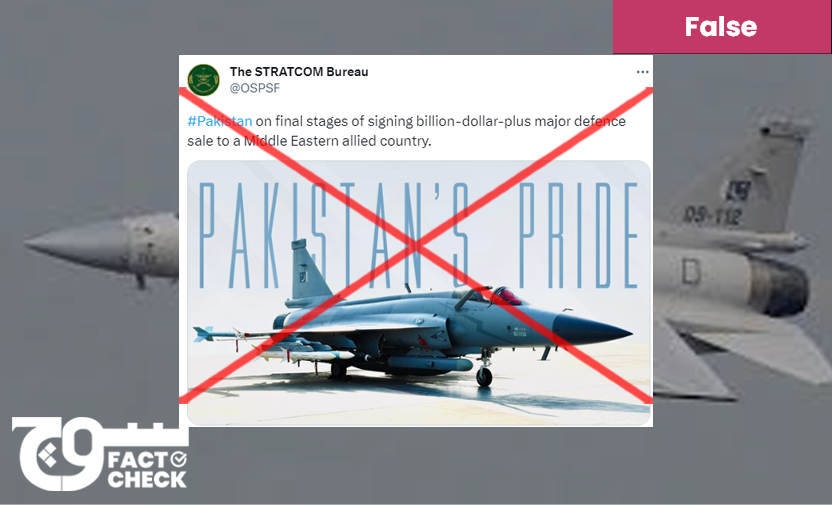
Claim: Pakistan is in the final stages of signing a billion-dollar-plus defence sale to a Middle Eastern country.
Fact: The claim is false. Unlike other deals with Myanmar, Nigeria and Argentina in the past, there is no reported and verified news that a deal has been initiated, and no Middle Eastern stakeholders have formally expressed interest in the sale of a jet.
The STRATCOM Bureau, which claims to be a non-partisan think tank dedicated to strategic communications, posted a tweet on 20 June 2023, claiming that Pakistan is in the final stages of signing a billion-dollar-plus defence sale to a Middle Eastern country. The tweet was accompanied by an image of the Pakistani JF-17 fighter jet, implying that the deal involves the sale of this jet.
Soch Fact Check found the claim false and unsubstantiated. There is no credible evidence or official confirmation that Pakistan is close to finalising a major defence sale involving the JF-17 aircraft.
What is the JF-17 Thunder?
Pakistan’s JF-17 Thunder fighter jets have garnered interest from several countries, primarily in Africa, Asia, and South America. However, it’s worth noting that no Middle Eastern country has shown interest in purchasing the JF-17 jets in the near future.
As of 2023, the JF-17 Thunder is currently in service in three countries: Pakistan, Myanmar, and Nigeria, with a total of 145 planes in operation as of October 2021. Other countries are also expressing interest in, and initiating formal processes to purchase the JF-17. Iraq has reportedly agreed to buy at least 12, while Egypt has shown interest in expanding defence cooperation with Pakistan, which includes the acquisition of JF-17s. Azerbaijan, Bolivia, and Argentina are also considering acquiring the jet. Notably, no Middle Eastern country is reported to be in the advanced stages of a deal or considering a purchase at this time.
Fact or Fiction?
Soch Fact Check analysed the claim and found that it is based on speculation and misinformation. Firstly, it is highly unlikely that a significant defence deal involving a billion dollars or more would remain unnoticed or concealed until the final stages. Major defence sales are typically well-documented and extensively covered by the media throughout the entire process, from initial discussions to final agreements.
Secondly, considering the cost of the JF-17 Thunder aircraft, which is approximately $15 million to $25 million per unit, a billion-dollar-plus deal would entail the sale of dozens of aircraft. The acquisition of such a substantial number of aircrafts by a Middle Eastern country would present logistical challenges and attract significant media attention, making it difficult to hide.
To understand the process, we’ll take a closer look at the JF-17 deals covered extensively by the media in the past. For instance, Myanmar was the first country to order JF-17 Thunder jets from Pakistan. Their initial purchase consisted of 16 jets in 2015, with media reports about a Chinese bid to supply JF-17’s to Myanmar stretching back to 2001. The completion of this transaction involved negotiations, discussions on technology transfer, and financial agreements. The process took time as multiple steps needed to be finalised before the purchase was confirmed. Subsequent purchases of four additional jets were facilitated through Chinese assistance, highlighting the step-by-step nature of cooperation and procurement.
Nigeria also expressed interest in the JF-17 jets and eventually placed an order for three aircrafts in 2016. However, it wasn’t until 2018, after four years of negotiations, that the deal to sell these jets to Nigeria was approved by Pakistan’s economic coordination committee at a cost of $184.3 million. This exemplifies the meticulous and time-consuming nature of the procurement process.
Regarding Argentina, their interest in the JF-17 jets has spanned over a decade. Despite reports indicating potential progress and China’s willingness to support the acquisition program, concrete details about the deal reaching the “final stages” remain elusive. Official visits, negotiations, and agreements are part of the process. This is another example of how significant progress necessitates extensive procedures and media coverage. In the absence of substantial reported steps, it is unlikely that a major defence sale with a Middle Eastern ally is imminent.
Virality
The tweet received more than 15,000 views. We found the exact same post shared on Facebook here, here, and here.
Conclusion: The claim that Pakistan is in the final stages of signing a billion-dollar-plus defence sale to a Middle Eastern country is based on speculation and misleading. The acquisition of JF-17 jets by any country involves multiple intermediate steps before reaching the final stages of a deal. These steps may include negotiations, technology transfer agreements, financial arrangements, regulatory approvals, and contractual formalities, all of which are typically covered by the media. It is important to rely on verified information and substantial evidence to assess the progress of defence sales.
To appeal our fact-check, please send an email to appeals@sochfactcheck.com
